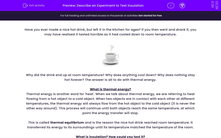Have you ever made a nice hot drink, but left it in the kitchen for ages? If you then went and drank it, you may have realised it tasted horrible as it had cooled down to room temperature.

Why did the drink end up at room temperature? Why does anything cool down? Why does nothing stay hot forever? The answer is all to do with thermal energy.
What is thermal energy?
Thermal energy is another word for 'heat'. When we talk about thermal energy, we are referring to heat flowing from a hot object to a cold object. When two objects are in contact with each other at different temperatures, the thermal energy will always flow from the hot object to the cold object (it is never the other way around). This process will continue until both objects reach the same temperature, at which point the energy transfer will stop.
This is called thermal equilibrium and is the reason the nice hot drink reached room temperature. It transferred its energy to its surroundings until its temperature matched the temperature of the room.
What is insulation? How could you test it?
An insulator is a poor conductor. It is a material that is full of air gaps, which will slow down the rate of thermal energy transfer. If a hot object is wrapped in an insulator, it will still transfer its thermal energy to the surroundings, but it will take longer to cool down.
You can experiment with this in a laboratory. To test a material's ability to insulate heat, you would do the following:
- Wrap a beaker in a sample of the material
- Place a thermometer in the beaker
- Pour boiling water into the beaker
- Start a timer
- Record the temperature every minute for a given period of time
.jpg)
In this example, a student has wrapped their beaker in cotton wool.
Results and conclusions
To keep this a fair test, when testing other materials, you would have to make sure that you poured the same amount of water, at the same starting temperature, into the beaker each time, and you kept the thickness of each material the same.
The material that takes the longest amount of time to cool down will be the best insulator, as it will remain at a higher temperature over the same period of time. Materials such as wool and sponge are good insulators as they absorb the heat energy, while shiny materials such as aluminium foil are very good insulators as they reflect the infrared radiation which is transferring the thermal energy.

Have you ever had a drink from a vending machine? You may have noticed that the cup was made of paper, plastic, or cardboard. These materials are all used because they are good insulators. Not only do they keep your drink warm, but they also slow down the heat transfer from the hot drink into your hands, so it does not burn you.
Have a go at some questions now. You can pause and have a drink before you start if all this talk has made you thirsty!








